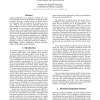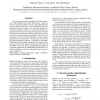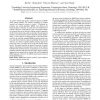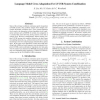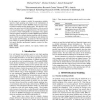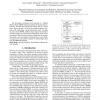113
click to vote
INTERSPEECH
2010
14 years 9 months ago
2010
Speaker-normalization and -adaptation methods are essential components of state-of-the-art speech recognition systems nowadays. Recently, so-called invariant integration features ...
132
click to vote
INTERSPEECH
2010
14 years 9 months ago
2010
This paper presents a Bayesian approach for Gaussian mixture model (GMM)-based speaker identification. Some approaches evaluate the speaker score of a test speech utterance using ...
INTERSPEECH
2010
14 years 9 months ago
2010
To achieve natural high quality synthesised speech in HMMbased speech synthesis, the effective modelling of complex acoustic and linguistic contexts is critical. Traditional appro...
145
click to vote
INTERSPEECH
2010
14 years 9 months ago
2010
Extractive multi-document summarization is the task of choosing sentences from a set of documents to compose a summary text in response to a user query. We propose a generative ap...
120
Voted
INTERSPEECH
2010
14 years 9 months ago
2010
State-of-the-art large vocabulary continuous speech recognition (LVCSR) systems often combine outputs from multiple subsystems developed at different sites. Cross system adaptatio...
INTERSPEECH
2010
14 years 9 months ago
2010
This paper describes a system for assistive writing, the Speech Supplemented Word Prediction Program (SSWPP). This system uses the first letter of a word typed by the user as well...
110
click to vote
INTERSPEECH
2010
14 years 9 months ago
2010
One of the difficult problems of acoustic modeling for Automatic Speech Recognition (ASR) is how to adequately model the wide variety of acoustic conditions which may be present i...
140
click to vote
INTERSPEECH
2010
14 years 9 months ago
2010
It is generally known that a well-designed excitation produces high quality signals in hidden Markov model (HMM)-based speech synthesis systems. This paper proposes a novel techni...
127
click to vote
INTERSPEECH
2010
14 years 9 months ago
2010
In this paper we evaluate a method for generating synthetic speech at high speaking rates based on the interpolation of hidden semi-Markov models (HSMMs) trained on speech data re...
132
click to vote
INTERSPEECH
2010
14 years 9 months ago
2010
We investigate incremental word learning in a Hidden Markov Model (HMM) framework suitable for human-robot interaction. In interactive learning, the tutoring time is a crucial fac...
